BOSC 2017 in Prague, the land of stories (and beer)
This is a guest blog post from Farah Zaib Khan, who was supported by the ongoing Open Bioinformatics Foundation travel fellowship program to attend our annual conference BOSC 2017 and its preceding Codefest in Prague, July 2017. The OBF’s Travel Fellowship program continues to help open source bioinformatics software developers with funding to attend conferences or workshops. The current call closes 15 December 2017, you might want to apply?
So the journey started back in May 2017 when I met Common Workflow Language (CWL) co-founder, Michael R. Crusoe during his visit to our University (University of Melbourne). I have been working with CWL team since 2015 but it was only then we met in person and discussed various aspects of the CWL standard and how we can collaborate to incorporate principles of Provenance modelling to capture retrospective provenance of CWL workflow enactments. We started working on an idea which led to poster submission and acceptance at Bioinformatics Open Source Conference (BOSC) 2017. I was excited as well as nervous (will explain how this changed later 🙂 ). Excited because this was my very first time attending any BOSC and ISMB conference and nervous because of the feeling that the names that you see at the top of high quality research articles will be there and you get to meet and talk to world class scientists doing wonders.
Nervous and excited I prepared for all the travelling which involved applying for a visa of course (going to Sydney for that) and arranging accommodation, conference registration, booking plane ticket and finally receiving the visa 7 days before my flight. The Czech Consulate was very professional and kind to process the visa in just 7 working days. I left Melbourne to attend 2-Day OBF Codefest followed by 2-Day BOSC and remaining ISMB conference. My Airbnb host was waiting for me when I reached and welcomed me warmly. She had the whole day planned for us as I reached at 9 am July 19th and the codefest had to commence on July 20th. She was keen to learn about my culture, home country, language and research too :). During the day we roamed around the City, had lunch and she shared information about the Czech history and how late 80’s Velvet Revolution changed the economic conditions of the country.
In the evening of my first day, I had a dinner with few members of Seven Bridges team and CWL working group (thanks to Michael for arranging this) at an amazing vegan restaurant in the Old town. We kick started discussion of our work informally during dinner where SevenBridges team introduced their super cool open source toolkit, Rabix for describing the CWL tools workflows. I presented the idea of CWL provenance module which we had planned to work on during the OBF Codefest the very next day. Mostly it was getting to know the teams and getting ready for the next day while enjoying delicious dinner in the heart of Prague Old town.
All geared up, next morning I took a subway from the station right next to Congress center to reach Brmlab which is a non-profit hackerspace self supported by community. The transport system of Prague is commendable as despite the signs written Czech, it was quite straight forward to follow Google maps and take the right subways, trams or buses. When I reached, Brad Chapman,Matúš Kalaš and others were already there making arrangements, providing enough extension cables, arranging food (with many vegan friendly options) and making sure everything is in place. There were more than 60 participants for this open collaborative event to build things and discuss future prospects of research together. The day kick started with introductions and organization into groups to work on related projects. This was followed by coffee and local produce (fruits, bread and pastries) break where people carried on with individual introductions and conversations.
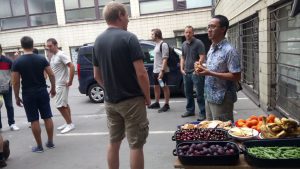
“Breakfasting” in open air outside the lab. Image was originally shared here.
Various groups started working on different projects from 10 am to 1 pm. These projects include MultiQC, biopython, nextflow, Singularity support in CWL, Provenance support in CWL, CWL SDK and Rabix . Our group led by Stian Soiland-Reyes started working on Provenance analysis and had a very useful discussion about what to capture from a workflow run retrospectively and how to structure the Provenance of a CWL workflow run. To start with, we decided to include a provenance module in reference implementation cwltool developed by CWL team. Nervously I started but now it felt like home and we got to work during 10am-1pm work window. I had guidance through out this time by people around me and I would like to thank them once more 🙂 .
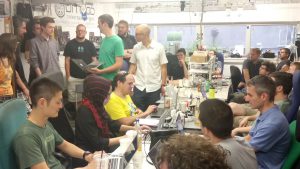
Work in Progress for 10am-1pm session
At 1 pm, we took a lunch break but before going for lunch break all the groups gathered and presented their progress so far. A round of applause for the organizers and sponsors who kept the supply of coffee running through out the day. The lunch was delicious pizza with local flavored soft drinks. Again all dietary requirements were accounted for and everyone seemed to enjoy “across-group” discussion and food. After lunch break the group gathered again and started working from 2 pm to 6 pm before leaving for the group dinner. We kept working on our project idea and all the groups reported at 6 pm presenting their progress and headed out for the group dinner. Our group stayed back as Brad graciously offered to stay back if someone wants to continue working. Luckily brmlab was also open 24/7 so we kept working till 9 pm. Late night dinner and headed to the apartment taking the same subway. The city was awake and happening even later in the night. At last the first very productive day came to an end.
July 21st was the second and last day of the Codefest. On my way to brmlab, I stopped at Copy General to get the print of my poster which was required to be displayed the next day. I must admit the staff at this shop was very professional and helpful. They made sure I get the right size of my poster (as it was in landscape orientation) and were quite flexible about the pick up time. Getting done with this important task, I was relaxed and headed to the lab for second day of codefest. The day followed the same pattern as July 20th starting with projects’ updates, plans to be followed for the day followed by coffee and breakfast. Our organizers collected some best quality local produce from a farmer’s market and kept everything organized efficiently.
We further worked on the implementation of a basic Research Object generation as a result of CWL workflow run. By the lunch time we were able to complete the set goals and presented out progress. Everyone was excited and engaged in working with their groups and contributing in every way they could. At 6 pm every group leader wrapped up their progress through out these two days and everyone participated in cleaning the space as it is a community-run space shared by everyone. At the end of these two amazing days, I looked back and realized I was nervous for nothing. As Brad Chapman says and I quote
“BOSC is all about getting people together and learning from each other” .
I don’t think anyone can disagree with this statement and the idea of community led projects and open source bioinformatic software feels real and in practice when one interacts and participates in events like OBF-Codefest and BOSC. The codefest ended with dinner at Zly cafe near the Congress center where the next four days are scheduled.
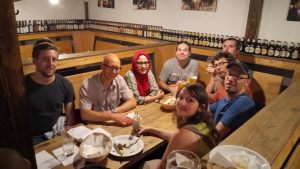
Dinner at Zly Cafe
New day, new tasks.. July 22nd was the first day of BOSC 2017 and at the same time all the posters were required to be hanged in the morning. I rushed to the copy general to collect my poster which was ready the same day. On my way to the shop I met loving and most friendly Monica Munoz-Torres from UC Berkeley who was volunteering as part of organizing committee (presenting Apollo later as well) and was headed to the same copy center. We had good conversation about open source bioinformatics initiatives and her work as volunteer organizing BOSC which she calls her favorite conference 🙂 .
Rushed back to the Congress center, arranged the poster on its designated location along with 100s of amazing posters and headed to attend BOSC opening talks. I was impressed by OBF progression and their support for researchers by providing OBF Travel scholarship and participation in organizing Google summer code camps. Brad presented the summary of Codefest afterwards which had a slide we prepared for our part of work [Provenance Support in CWL]. There were many talks related to CWL application and usage during the whole day. Rabix composer, Rabix Executor, CWL Viewer, bcbio and many more CWL oriented work was presented. We organized a Birds of a feather session during lunch time to discuss what should be captured in a Research Object when a CWL workflow is enacted. This session initiated interesting discussion about different levels and views of Provenance.
In the afternoon Björn Grüning’s talk was very interesting where he empathized on Findability, Accessibility, Interoperability, and Reusability (FAIR) principles for tool deployment and resolving tool dependencies using package managers as Conda and BioConda. Later during this and next day FAIR bingo became a real thing as part of most of the talks. The highlight of the day was indeed the key note speech “Open Sourcing Ourselves” by Madeleine Ball who is working on the project Open Humans. She discussed inspiring Dana Lewis’s story who is creator of “Do-It-Yourself Pancreas System” and made her own continuous glucose monitor alarms louder further leading to the foundation of OpenAPS.
On the second day of BOSC, we had more talks and updates starting with the key note speech “Bioinformatics for Personalized Medicine: Looking Beyond the Genome” by Christoph Bock. He presented few examples from cancer research explaining how epigenomic mutations can be mapped to identify the various aspects of cancer. The topic was of my personal interest and indeed very informative. The ultimate goal is to make the dream of personalized medicine a reality using the available technologies including use of CRISPR for modelling epigenomic factors.
After the key note speech I attended Monica Munoz-Torres’s talk about Apollo , collaborative genomic annotation editor that automatically synchronizes the work of geographically separated research community and establishes a network between the researchers, more like a social network for curators according to Monica. The huge user base working on different genomes interact using Apollo and share the curated genomes. The next talk by Pjotr Prins was about Journal of Open Source Software (JOSS) , an initiative all available on GitHub for accrediting academic software equipped with documentation. In this way, software engineers can publish their software without getting to write a paper about it. It will facilitate the users as the software will be better documented when intended to be published.
Another impressive talk was about “Distance-based, online bioinformatics training in Africa: the H3ABioNet experience” by Nocola Mulder from University of Cape Town. She described the efforts made to bring bioinformatics training to all the places in Africa using a distributed classroom model. Due to internet connectivity issues and other factors, the lectures were recorded beforehand. The lectures were delivered live (online) as well but if there is a connectivity issue, the recordings were available. In addition, various practical assignments were designed to enhance the learning experience. The combination of live lectures, online classes, recordings and practical exercises together results in connectivity and highly interactive environment. Another highlight from the session was release of open source variant calling toolkit GATK4 coupled with WDL and Cromwell.
There were many more talks that I attended and enjoyed such as talk by Ted Liefeld about GenomeSpace, Kai Blin about anitSMASH and Kenzo-Hugo Hillion about BioThings SDK. Oh and during lunch time I attended the BoF session organized by JOSS (was intrigued after listening to the presentation earlier). Later in the day, the panel discussion was worth attending chaired Madeleine Ball, Prof. Carole Goble, Andrew Su and Nick Loman. Carole Goble’s point made perfect sense that the young scientists although are willing to share the data and are open to collaborations where as senior scientists (PIs) consider it more effort with less rewarding results.
Day 2 ended with an amazing closing key note speech by Nick Loman who discussed virus outburst surveillance using the Oxford nanopore minION sequencing technology, using two examples, namely Ebola outburst in Africa in 2015 and the Zika virus in Brazil. “If you can’t move the subjects and samples to the sequencer, bring the sequencer to the subject”.
Oh wait the day actually ended with an end of BOSC dinner ..
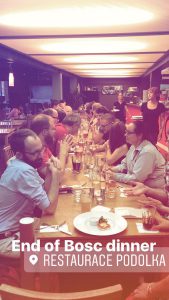
but before that we stopped at GigaScience ‘s 5th birthday for cake and free GOT themed “Data is coming” T shirt which they graciously saved ^_^ (because I reached late). Why did I reach late?
Yes I was there for a poster presentation 🙂 . The poster presentation was from 6-7 pm and was a terrific experience talking about my work and progress we made during code fest earlier.
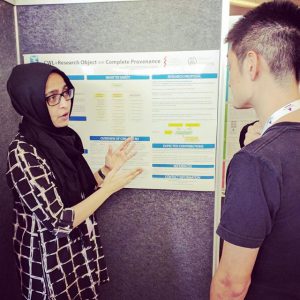
All in all, everything was amazing, the people, the venue, the city, the knowledge gain, the help you get from peers, the encouragement from fellow researchers. Remember the nervousness I mentioned at the beginning of this post ? ALL GONE after this fruitful experience. Few things that might be helpful in future: We should work towards resolving the issue of gender imbalance that was seen (and usually seen in conferences), discussed and acknowledged during Code fest and BOSC. I think we can advertise the Codefest and the objectives in more detail so people can attend even if they don’t have a group there to start with. This is by no means a complaint or criticism, just something I observed and felt as there were 3 female participants out of >60 total participants of Codefest. I think in future we can make this better and advertise about the welcoming environment of Codefest and BOSC.
Thanks to OBF for covering my air fare by refunding through OBF travel funding. I would also like to thank Data and Software Preservation for Open Science (DASPOS) (working in developing workflow and provenance tracking for high energy physics) for covering the rest of conference related expenses . In the end, this post will be incomplete if I don’t thank Michael Crusoe for the mentoring, encouragement, guidance, all the support, connecting me with DASPOS and providing prompt feedback whenever I ask 🙂 .
P.S. Some other day, I might write about wandering experience in Prague Castle, Old Town, Charles Bridge, local wooden sovereigns, amazing food especially Goats cheese and of course… lemonades 🙂 .